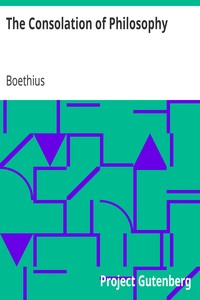The Consolation of Philosophy by Boethius
"The Consolation of Philosophy" by Boethius is a philosophical work written in 523 while imprisoned and awaiting execution for treason. In this dialogue between the condemned author and Lady Philosophy personified, Boethius explores how happiness remains attainable despite misfortune, why evil exists in a God-governed world, and the nature of fate versus free will. Blending classical Greek philosophy with universal spiritual themes, this prison meditation became one of the Middle Ages' most
influential texts, bridging ancient thought and medieval Christianity. (This is an automatically generated summary.)
Read or download for free
| How to read | Url | Size | |||
|---|---|---|---|---|---|
| Read now! | https://www.gutenberg.org/ebooks/14328.html.images | 317 kB | |||
| EPUB3 (E-readers incl. Send-to-Kindle) | https://www.gutenberg.org/ebooks/14328.epub3.images | 340 kB | |||
| EPUB (older E-readers) | https://www.gutenberg.org/ebooks/14328.epub.images | 344 kB | |||
| EPUB (no images, older E-readers) | https://www.gutenberg.org/ebooks/14328.epub.noimages | 177 kB | |||
| Kindle | https://www.gutenberg.org/ebooks/14328.kf8.images | 546 kB | |||
| older Kindles | https://www.gutenberg.org/ebooks/14328.kindle.images | 545 kB | |||
| Plain Text UTF-8 | https://www.gutenberg.org/ebooks/14328.txt.utf-8 | 269 kB | |||
| Download HTML (zip) | https://www.gutenberg.org/cache/epub/14328/pg14328-h.zip | 332 kB | |||
| There may be more files related to this item. | |||||
Similar Books
About this eBook
| Author | Boethius, 480-525? |
|---|---|
| Translator | James, H. R. (Henry Rosher), 1862-1931 |
| Title | The Consolation of Philosophy |
| Note | Wikipedia page about this book: en.wikipedia.org/wiki/On_the_Consolation_of_Philosophy |
| Credits |
Produced by Jonathan Ingram, Karina Aleksandrova and the PG Online Distributed Proofreading Team. |
| Reading Level | Reading ease score: 65.3 (8th & 9th grade). Neither easy nor difficult to read. |
| Language | English |
| LoC Class | B: Philosophy, Psychology, Religion |
| Subject | Philosophy and religion |
| Subject | Happiness |
| Category | Text |
| EBook-No. | 14328 |
| Release Date | Dec 11, 2004 |
| Most Recently Updated | Oct 28, 2024 |
| Copyright Status | Public domain in the USA. |
| Downloads | 6866 downloads in the last 30 days. |
| Project Gutenberg eBooks are always free! | |

